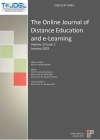TOJDEL - Volume 1 - Issue 3 - July 2013
 A Comparative Study on the Relationship between Meta-Cognitive Thinking and Motivation for Achievement among Gifted and Non-Gifted Secondary School Students in Irbid City, Jordan.
A Comparative Study on the Relationship between Meta-Cognitive Thinking and Motivation for Achievement among Gifted and Non-Gifted Secondary School Students in Irbid City, Jordan. Wail├é┬ĀMuin├é┬Ā(Al├óŌé¼┬ÉHaj├é┬ĀSaid)├é┬ĀIsmail,├é┬ĀZaharah├é┬ĀHussin,├é┬Ā├é┬ĀAdelina├é┬ĀAsmawi,├é┬Ā├é┬Ā Saedah├é┬ĀSiraj
Abstract: Many educators call for special attention and care to be given to the gifted in order for them to be able to better serve and develop the community. The interest in the gifted increased in mid-21st century as many specific education programs were designed and many studies investigated their characteristics. These were carried out with an aim to cater to their needs and match their lifestyle in a better way so that they are able to play an efficient and pivotal role for the development of their community (Al-Saidi, 2007).
 Authentic Learning in Multimedia
Authentic Learning in Multimedia ├āŌĆōzlem├é┬ĀCANAN├é┬ĀG├ā┼ōNG├āŌĆōREN
Abstract: In nowadays where rapidly evolving technology especially computer technology has an important role in our lives; the concepts of authentic learning and multimedia stand out. While the concept of multimedia describe the applications of environments which are created by using a combination of different media types, authentic learning characterizes the type of leaning which students learn in their natural environment with the real-world issues and complex problems. In this study, the terms and characteristics of multimedia and authentic learning are explained; reasons and examples of the authentic learning in multimedia are sorted.
 Gender Analysis of the Students Enrolled In Anadolu University Faculty of Economics, Faculty of Business Administration and Open Education Faculty
Gender Analysis of the Students Enrolled In Anadolu University Faculty of Economics, Faculty of Business Administration and Open Education Faculty Emine├é┬ĀDEM├ä┬░RAY,├é┬ĀSerpil├é┬ĀD├ā┼ōNDAR
Abstract: The purpose of this study is to analyze the undergraduate and associate students enrolled in Anadolu University Faculties of Business Administration, Economics and Open Education, which are providing education through the distance education systems, in terms of gender. For this purpose, a survey consisting of 28 questions was prepared. This survey has been sent to all active students enrolled in these faculties by e-mail. Primarily, the following issues are mentioned in the study; information on distance education system of Anadolu University and faculties providing education through this method, number of students in faculties, the rates of the preferred departments in terms of man and woman. Thereafter, the importance of the distance education for women is mentioned in terms of gender notion, man-woman roles and gender equality. At the findings stage, 1651 surveys received from students have been assessed by being analyzed in SPSS program. The followings have been taken into consideration in the assessment; demographic characteristics of students, participation rate in programs, reasons for preference of the distance education, time allocated for their courses, computer and internet utilization, whether they prefer the distance education in case of different gender especially in terms of woman, the materials from which they benefit at the utmost in the distance education system, and finally the data have been assessed comparatively in terms of gender.
 Impact of Perceived Student Leadership Role on the Academic Performance of Distant Education Students in Ghana
Impact of Perceived Student Leadership Role on the Academic Performance of Distant Education Students in Ghana Paul├é┬ĀDela├é┬ĀAhiatrogah,├é┬ĀAlbert├é┬Ā├é┬ĀKobina├é┬ĀKoomson
Abstract: The purpose of this study was to determine the extent to which distant education (DE) student leaders perceive their role and establish whether this has significant correlation with their academic performance. Specifically, the study was interested in the influence that the intervening variables of age, level, employment status, and prior leadership experience have on their perceived leadership role. The role of gender in this direction was also considered. Guiding this study was the servantleader theoretical framework. According to Greenleaf (2003) students consider the building of trust as the central issue for leadership by means of service. It was in line with this problem that most student leaders profess that they want to serve their fellow students instead of lording it over them. A questionnaire based on student leadership role with a Cronbach├óŌé¼Ōäós alpha reliability coefficient of .855 was used to collect data. Predictive Analysis Software (PASW) was used to analyze the data. Regression and correlation statistical tools were used to test the hypothesis formulated to guide the study. The results of the study revealed that DE students├óŌé¼Ōäó perception of their leadership role is high. However, this high perception is neither dependent on background of student leaders nor gender. It also showed that high academic performance is not dependent on perceived student leadership role expectation let alone their duties and responsibilities. However, perceived leadership role expectation was found to be the least potent contributor to academic performance of distant education (DE) student leaders. It is, therefore, recommended that DE students should be elected strictly on merit and not on age, level, employment status, and prior leadership experience. DE student leaders should also be given training in the positions they have been elected for. Finally, DE students leaders should strive to combine their studies with the leadership position they occupy.


